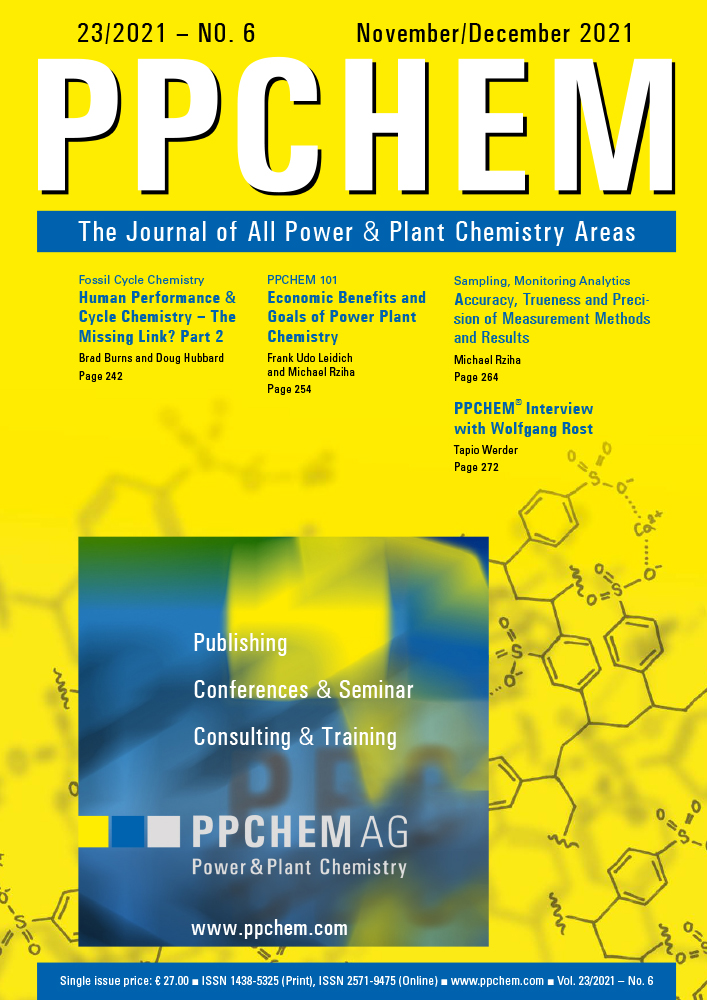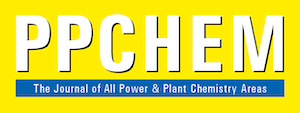Download the Article’s PDF.
Author: anderthalbAdmin
Article – Issue 01 (2022) – How IAPWS-IF97 can be used to optimize the so-called “Cleaning Force Ratio” during the steam cleaning of power plants
Article – Issue 01 (2022) – Review – vgbe Chemistry Conference 2021
Download the Article’s PDF.
Article – Issue 01 (2022) – Cleaning of Newly Erected Steam Boiler Plants and Associated Pipework
Article – Issue 01 (2022) – Deviation in Turbidity Readings at a Low Range
Issue 06 (2021)

For members only
ABSTRACTS
Human Performance & Cycle Chemistry – The Missing Link? Part 2
Brad Burns and Doug Hubbard
On most units assessed by the Electric Power Research Institute (EPRI) across the world, cycle chemistry is well controlled and good results are obtained 99.9 % of the time. Fossil and combined cycle power plants on a global scale continue to boast higher cycle chemistry benchmarking scores, installation of new instrumentation and alarming, and management support for cycle chemistry. The exception, however, continues to be major cycle chemistry excursion events that happen infrequently, yet with great consequences.
Often, when an unmitigated major cycle chemistry upset event occurs, root cause investigations pin the event on inadequate skills or knowledge (of individuals). It is therefore believed that additional training and/or disciplinary corrective action solves the root cause of the event and will prevent poor operator response to out-of-spec chemistry from recurring.
But does this approach produce the desired results? This article continues part 1, which was published in the January/February 2021 edition of this publication. Human performance improvement was described as the potential “missing link” to achieve true cycle chemistry improvement. This article builds upon the previous one by providing practical examples and suggestions for implementing improved defenses in a plant.
PPCHEM® 2021, 23(6), 242–251
For Members only
The Economic Benefits and Goals of Power Plant Chemistry
Frank Udo Leidich and Michael Rziha
Thus far, the chemist in a power plant has quite often been regarded as a necessary evil or as inevitable costs. The purpose of this paper is to explain the economic benefits of a chemist, the need to have a specialist on the operation team, the purpose and goals of the job, and the expectations of the chemist from the power plant management’s point of view.
Of course, the economic impact, the possible risks, and (monetary) damage that might arise if the job is not done as it should be are discussed here as well.
This paper concentrates on the goals and purpose of the chemist’s activities regarding the water/steam cycle and the components therein. Future papers will also deal with the chemist’s footprint on the cooling system, including the cooling water make-up system, the flue gas path, and the treatment of other systems and machines.
PPCHEM® 2021, 23(6), 254–263
For Members only
Accuracy, Trueness and Precision of Measurement Methods and Results
Michael Rziha
The present paper is an updated revision of a paper presented 22 years ago at the joint European NUSIS-ICMG-VGB Chemistry Online Process Instrumentation Seminar in Brügge, Belgium (April 20–22, 1999).
The original paper was prepared by Dr. J. Fahlke, Grosskraftwerk Mannheim, Mannheim Central Power Station, Mannheim; W. Fichte, Consultant, Ismaning; E. V. Maughan, Tablar Messtechnik, Duisburg; H. D. Pflug, Consultant, Bergen-Enkheim; and H.-G. Seipp, ABB, Mannheim – all located in Germany.
I would like to express my sincerest thanks to Dr. J. Fahlke for providing me with the original paper and permitting me to use it as the basis for this updated version.
This paper is an attempt to facilitate understanding of the rather abstract and in part complicated definitions of the ISO 5725 by combining them with some illustrations. This approach, although it may require getting used to, will help to promote a better understanding between manufacturers, suppliers, purchasers and operators of continuously operating measuring instruments in plant cycle chemistry.
PPCHEM® 2021, 23(6), 264–270
For Members only
PPCHEM Interview with Wolfgang Rost
Tapio Werder
Wolfgang Rost joined the PPCHEM team in October 2021 as Senior Key Expert for Power Plant Technology. Tapio Werder, Editor in Chief of the PPCHEM® journal, has interviewed Wolfgang to introduce him to our readers.
PPCHEM® 2021, 23(6), 272–274

